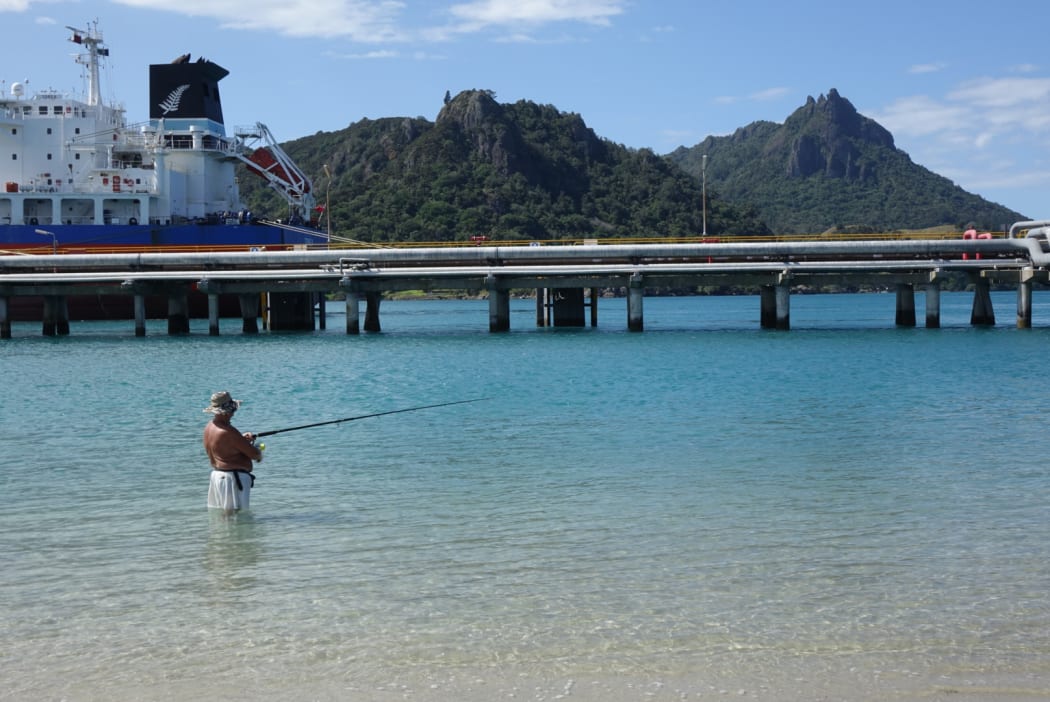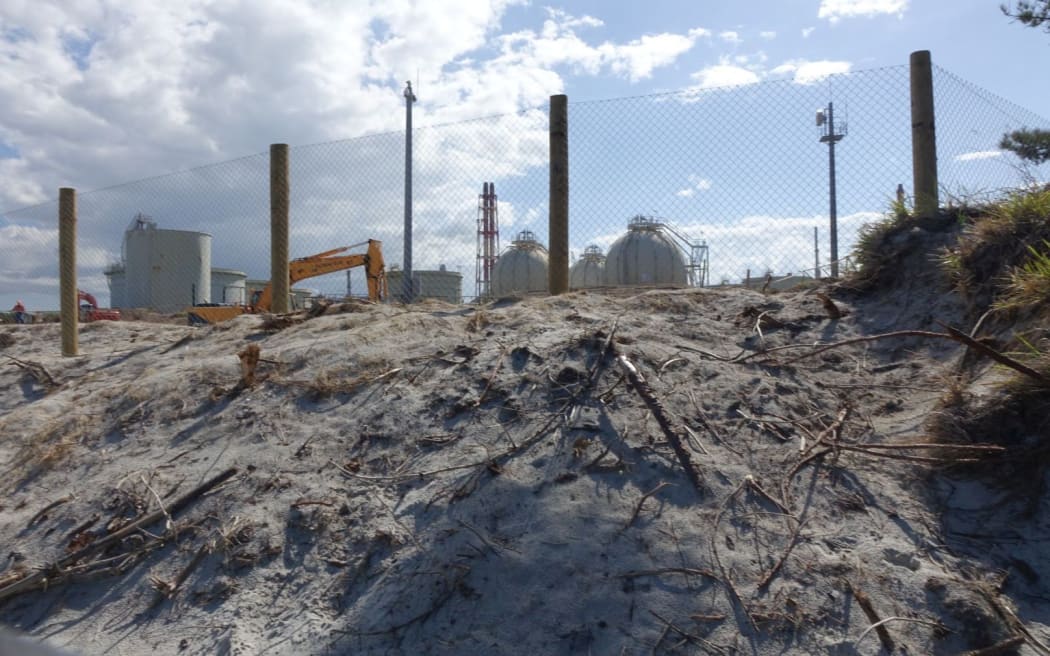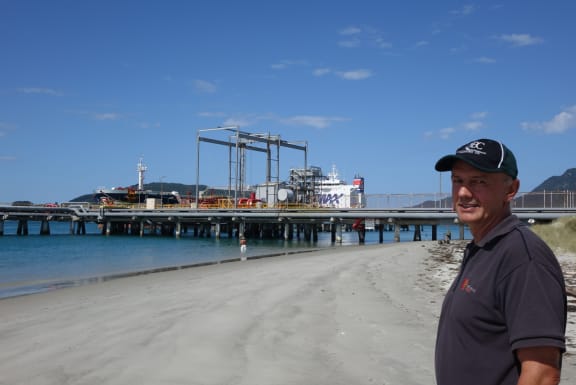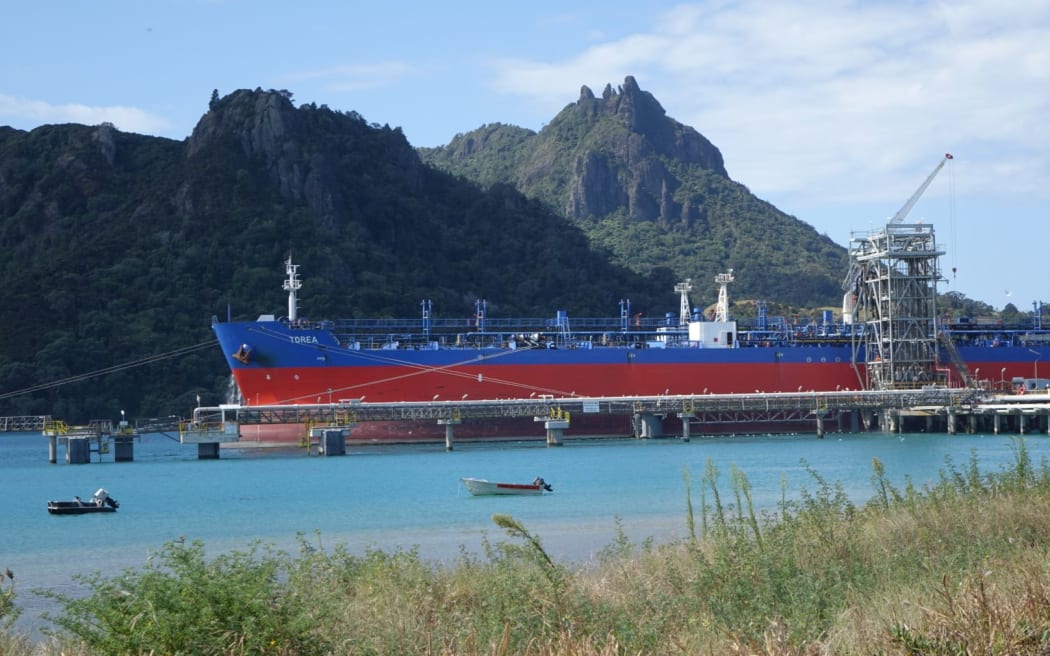A massive pipi bed in Whangarei harbour is dying, and there are fears the change could destabilise the harbour - and Marsden Point itself.

A man fishes in the waters at Marsden Point. Photo: RNZ / Lois Williams
The shellfish on Mair Bank have fed locals for generations, but they are disappearing fast and scientists do not know why.
The volume of pipis has slumped from 10,000 tonnes to less than 100 tonnes, sparking fears the massive sandbank, which protects the harbour entrance, will disappear.
For as long as anyone can remember, there have been pipis on Mair Bank. People swam there and caught fish - with towering oil tankers on one side, and giant log piles on the other.
The big sandbank, shaped a bit like a shark's tooth, lies just off Marsden Point. You could wade out there at low tide and scoop up your daily limit of 150 in a couple of minutes. But not any more.
Over the last four to five years the pipi population has collapsed. A NIWA fisheries scientist, James Williams, said the decline had been drastic.
He said the bank had been eroding from the south and gaining height; coinciding with an apparent absence of juvenile pipi.
"There was a huge biomass there of pipi, everywhere pretty much on the bank and sub-tidally of about 10,000 tonnes and that's been reduced to less than 100 tonnes from the 2014 survey," he said.
"So, less than one percent of what there was in 2005."
Dr Williams said pollution had not been a problem at Marsden Point: regular testing shows the water quality is very good, despite the presence of the oil refinery and the timber port next door.
Environmental changes suspected
Some, like local fisherman Roger Oliver, suspect over-harvesting has killed the pipi bed.
"You know people come up with the trailers hooked up to their 4x4s and sackfuls after sackfuls, well you can't go on like that indefinitely," Mr Oliver said.
"And then now they're crying shame because there're no pipis left."
Mair Bank was closed to pipi pickers last year but Dr Williams said the volume of shellfish being taken, including a commercial catch, was miniscule compared to the vast quantity available.
He said with a timber port now operating at Marsden Point, it might also be worth testing the water to rule out pollution by terpenes - compounds found in pine logs.
Dr Williams said it was not known what impact those compounds might have on pipi, but they could act as pesticides on some species.
However, Northport chief executive Jon Moore said run-off from the port's log storage area drained to a big settlement pond.
"It can pump to the harbour if it reaches a high level, so if you have a storm event, obviously the last thing you want is all of that overflowing so there's a pipeline back to the harbour," he said.
"It pumps on those high rain events, but at that point when you've got a heavy rainfall, most of the water that's coming through there is pretty damn clean anyway."
Dr Williams said in a 2005 survey, most pipi were of a medium size, and would be reaching the end of their natural span by about 2010, when the big die-back was noted.
He said if recruitment of young pipi was failing for whatever reason, there would naturally be a declining population.
He suspected natural environmental changes had interfered with the survival of young pipi.

Dune erosion at Marsden Point, in front of the oil refinery. Photo: RNZ / Lois Williams
Knock-on effects
Whatever the cause, the refinery and Northport are worried the loss of millions of shellfish could destabilise Mair Bank.
The New Zealand Refining Company's environmental manager, Riann Elliot, said if the bank goes, there would be knock-on effects for the harbour and the foreshore.

New Zealand Refining Company environmental manager Riann Elliot. Photo: RNZ / Lois Williams
He said the channel was 'self-dredging'.
"There's no maintenance dredging required here - that could be jeopardised, so the entry to the harbour could be jeopardised."
"Erosion along the foreshore along Marsden Point could change drastically. We've currently got a bit of an erosion problem and there's evidence to suggest that could accelerate."
New Zealand Refining chief executive Sjoerd Post said any increase in erosion had to be a concern for the refinery.
"Our site is very close to the sea perimeter, so the pipis dying out may cause instability in the bank which may lead to bigger consequences for us," said Mr Post.
"But first and foremost, we are really concerned around the fact that sort of an entire species seems to be dying out all of a sudden."
Mr Post said it was tangata whenua, Patu Harakeke, who first raised the alarm about the Mair Bank pipi beds.
New Zealand Refining and Northport back their call for urgent research into the problem.

An oil tanker at Marsden Point. Photo: RNZ / Lois Williams

